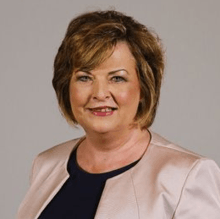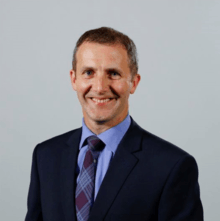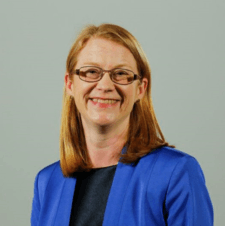Scottish National Party
The Scottish National Party (SNP; Scottish Gaelic: Pàrtaidh Nàiseanta na h-Alba, Scots: Scots National Pairtie) is a Scottish nationalist,[16][17] social-democratic[6][7][8] political party in Scotland. The SNP supports and campaigns for Scottish independence within the European Union,[4][18][19] with a platform based on civic nationalism.[20][21] The SNP is the third-largest political party by membership in the United Kingdom, behind the Labour Party and the Conservative Party and it is the largest political party in Scotland, where it has the most seats in the Scottish Parliament and 48 out of the 59 Scottish seats in the British House of Commons at Westminster. The current Scottish National Party leader, Nicola Sturgeon, has served as First Minister of Scotland since November 2014.
Scottish National Party Pàrtaidh Nàiseanta na h-Alba Scots National Pairtie | |
|---|---|
 | |
| Leader | Nicola Sturgeon |
| Depute Leader | Keith Brown |
| Leader in the House of Commons | Ian Blackford |
| Deputy Leader in the House of Commons | Kirsty Blackman |
| Founded | 7 April 1934 |
| Merger of | |
| Headquarters | Gordon Lamb House 3 Jackson's Entry Edinburgh EH8 8PJ |
| Student wing | SNP Students |
| Youth wing | Young Scots for Independence |
| LGBT wing | Out for Independence |
| Membership (2018) | |
| Ideology | |
| Political position | Centre-left[10][11][12] Big tent[13] |
| European affiliation | European Free Alliance |
| Colours | Yellow and black |
| House of Commons (Scottish seats) | 48 / 59 |
| Scottish Parliament[14] | 61 / 129 |
| Local government in Scotland[15] | 418 / 1,227 |
| Website | |
| www | |
Founded in 1934 with the amalgamation of the National Party of Scotland and the Scottish Party, the party has had continuous parliamentary representation in Westminster since Winnie Ewing won the 1967 Hamilton by-election.[22] With the establishment of the devolved Scottish Parliament in 1999, the SNP became the second-largest party, serving two terms as the opposition. The SNP gained power at the 2007 Scottish Parliament election, forming a minority government, before going on to win the 2011 Parliament election, after which it formed Holyrood's first majority government.[23] It was reduced back to being a minority government at the 2016 election.
The SNP is the largest political party in Scotland in terms of both seats in the Westminster and Holyrood parliaments, and membership, reaching 125,482 members as of December 2019, 48 MPs, 61 MSPs and over 400 local councillors.[24] The SNP is a member of the European Free Alliance (EFA). The party does not have any members of the House of Lords, as it has always maintained a position of objecting to an unelected upper house.[25][26]
History
Foundation and early breakthroughs (1934–1970)
The SNP was formed in 1934 through the merger of the National Party of Scotland and the Scottish Party, with The Duke of Montrose and Robert Bontine Cunninghame Graham as its first, joint, president.[27] Sir Alexander MacEwen was its first chairman.[28] Professor Douglas Young, who was the leader of the Scottish National Party from 1942 to 1945 campaigned for the Scottish people to refuse conscription and his activities were popularly vilified as undermining the British war effort against the Axis powers. Young was imprisoned for refusing to be conscripted.
The party suffered its first split during this period with John MacCormick leaving the party in 1942, owing to his failure to change the party's policy from supporting all out independence to Home Rule at that year's conference in Glasgow. McCormick went on to form the Scottish Covenant Association, a non-partisan political organisation campaigning for the establishment of a devolved Scottish Assembly.
However, wartime conditions also enabled the SNP's first parliamentary success at the Motherwell by-election in 1945, but Robert McIntyre MP lost the seat at the general election three months later. The 1950s were characterised by similarly low levels of support, and this made it difficult for the party to advance. Indeed, in most general elections they were unable to put up more than a handful of candidates.
The 1960s, however, offered more electoral successes, with candidates polling credibly at Glasgow Bridgeton in 1961, West Lothian in 1962 and Glasgow Pollok in 1967. Indeed, this foreshadowed Winnie Ewing's surprise victory in a by-election at the previously safe Labour seat of Hamilton. This brought the SNP to national prominence, leading to the establishment of the Kilbrandon Commission.
Becoming a major force (1970s)

Despite this breakthrough, the 1970 general election was to prove a disappointment for the party as despite an increase in vote share, Ewing failed to retain her seat in Hamilton. The party did receive some consolation with the capture of the Western Isles, making Donald Stewart the party's only MP. This was to be the case until the 1973 by-election at Glasgow Govan where a hitherto safe Labour seat was claimed by Margo MacDonald.
1974 was to prove something of an annus mirabilis for the party as it deployed its highly effective It's Scotland's oil campaign.[29] The SNP gained 6 seats at the February general election before hitting a high point in the October re-run, polling almost a third of all votes in Scotland and returning 11 MPs to Westminster. Furthermore, during that year's local elections the party claimed overall control of Cumbernauld and Kilsyth.
This success was to continue for much of the decade, and at the 1977 district elections the SNP saw victories at councils including East Kilbride and Falkirk and held the balance of power in Glasgow.[30] However, this level of support was not to last and by 1978 Labour revival was evident at three by-elections (Glasgow Garscadden, Hamilton and Berwick and East Lothian) as well as the regional elections.
This was to culminate when the party experienced a large drop in its support at the 1979 general election, precipitated by the party bringing down the incumbent Labour minority government following the controversial failure of that year's devolution referendum. Reduced to just 2 MPs, the successes of October 1974 were not to be surpassed until the 2015 general election.
Factional divisions and infighting (1980s)
Following this defeat, a period of internal strife occurred within the party, culminating with the formation of two internal groups: the proto-fascist Siol nan Gaidheal[31] and left-wing 79 Group. Traditionalists within the party, centred around Winnie Ewing, by this time an MEP, responded by establishing the Campaign for Nationalism in Scotland which sought to ensure that the primary objective of the SNP was campaigning for independence outwith a traditional left-right orientation, despite the fact that this would have undone the work of figures such as William Wolfe, who developed a clearly social democratic policy platform throughout the 1970s.
These events ensured the success of a leadership motion at the party's annual conference of 1982, in Ayr, despite the 79 Group being bolstered by the merger of Jim Sillars' Scottish Labour Party (SLP) although this influx of ex-SLP members further shifted the characteristics of the party leftwards. Despite this, traditionalist figure Gordon Wilson remained party leader through the electoral disappointments of 1983 and 1987, where he lost his own Dundee East seat won 13 years prior.
Through this period, Sillars grew influence in the party, developing a clear socio-economic platform including Independence in Europe, reversing the SNP's previous opposition to membership of the then-EEC which had been unsuccessful in a 1975 referendum. This position was enhanced further by Sillars reclaiming Glasgow Govan in a by-election in 1988.
Despite this moderation, the party did not join Labour, the Liberal Democrats and the Greens as well as civil society in the Scottish Constitutional Convention which developed a blueprint for a devolved Scottish Parliament due to the unwillingness of the convention to discuss independence as a constitutional option.[32]
First Salmond era (1990s)
Alex Salmond had been elected MP for Banff and Buchan in 1987, after the re-admittance of 79 Group members, and was able to seize the party leadership after Wilson's resignation in 1990 after a contest with Margaret Ewing. This was a surprise victory as Ewing had the backing of much of the party establishment, including Sillars and then-Party Secretary John Swinney. The defection of Labour MP Dick Douglas further evidenced the party's clear left-wing positioning, particularly regarding opposition to the poll tax.[33] Despite this, Salmond's leadership was unable to avert a fourth successive general election disappointment in 1992 with the party reduced back from 5 to 3 MPs.
The mid-90s offered some successes for the party, with North East Scotland being gained at the 1994 European elections and the party securing a by-election at Perth and Kinross in 1995 after a near miss at Monklands East the previous year.
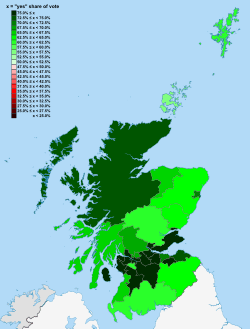
1997 offered the party's most successful general election for 23 years, although in the face of the Labour landslide the party was unable to match either 1974 election. That September, the party joined with the other members of the Scottish Constitutional Convention in the successful Yes-Yes campaign in the devolution referendum which lead to the establishment of a Scottish Parliament with tax-varying powers.
By 1999, the first elections to the parliament were being held, although the party suffered a disappointing result, gaining just 35 MSPs in the face of Salmond's unpopular 'Kosovo Broadcast' which opposed NATO intervention in the country.[34]
Opposing Labour-Liberal Democrat coalitions (1999–2007)
This meant that the party began as the official opposition in the parliament to a Labour-Liberal Democrat coalition government. Salmond found the move to a more consensual politics difficult and sought a return to Westminster, resigning the leadership in 2000 with John Swinney, like Salmond a gradualist[35], victorious in the ensuring leadership election.[36] Swinney's leadership proved ineffectual, with a loss of one MP in 2001 and a further reduction to 27 MSPs in 2003 despite the Officegate scandal unseating previous First Minister Henry McLeish.[37] However, the only parties to gain seats in that election where the Scottish Greens and the Scottish Socialist Party (SSP) which like the SNP support independence.
After an unsuccessful coup attempt in 2003, Swinney stepped down following disappointing results in the European elections of 2004[38] with Salmond victorious in the subsequent leadership contest despite initially refusing to be candidate.[39] Nicola Sturgeon was elected Depute Leader and became the party's leader in the Scottish Parliament until Salmond was able to return at the next parliamentary election.
Salmond government (2007–2014)

In 2007, the SNP emerged as the largest party in the Scottish Parliament with 47 of 129 seats, narrowly ousting the Scottish Labour Party with 46 seats and Alex Salmond becoming First Minister after ousting the Liberal Democrats in Gordon. The Scottish Green Party supported Salmond's election as First Minister, and his subsequent appointments of ministers, in return for early tabling of the climate change bill and the SNP nominating a Green MSP to chair a parliamentary committee.[40] Despite this, Salmond's minority government tended to strike budget deals with the Conservatives to stay in office.[41]
In May 2011, the SNP won an overall majority in the Scottish Parliament with 69 seats. This was a significant feat as the additional member system used for Scottish Parliament elections was specifically designed to prevent one party from winning an outright majority.[42][43] This was followed by a reverse in the party's previous opposition to NATO membership at the party's annual conference in 2012[44] despite Salmond's refusal to apologise for the Kosovo broadcast on the occasion of the Kosovo Declaration of Independence.[45]
This majority enabled the SNP government to hold a referendum on Scottish independence in 2014. The "No" vote prevailed in a close-fought campaign, prompting the resignation of First Minister Alex Salmond. Forty-five percent of Scottish voters cast their ballots for independence, with the "Yes" side receiving less support than late polling predicted.[46] This was suggested as due to Salmond's unpopularity among women[47] and Nicola Sturgeon won that year's leadership election unopposed.
Sturgeon years (2014 onwards)

The SNP rebounded from the loss in the independence referendum at the 2015 UK general election, led by Nicola Sturgeon. The party went from holding six seats in the House of Commons to 56, mostly at the expense of the Labour Party. All but three of the fifty-nine constituencies in the country elected an SNP candidate in the party's most comprehensive electoral victory at any level.[48]
At the 2016 Scottish election, the SNP lost a net total of 6 seats, losing its overall majority in the Scottish Parliament, but returning for a third consecutive term as a minority government despite gaining an additional 1.1% of the constituency vote, for the party's best ever result, from the 2011 election however 2.3% of the regional list vote. On the constituency vote, the SNP gained 11 seats from Labour, but lost the Edinburgh Southern constituency to the party. The Conservatives and Liberal Democrats each gained two constituency seats from the SNP on 2011 (Aberdeenshire West and Edinburgh Central for the Conservatives and Edinburgh Western and North East Fife for the Liberal Democrats).
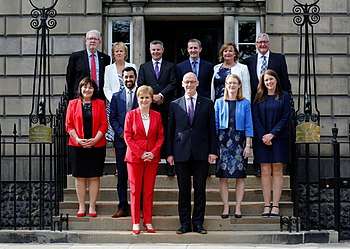
This election was followed by the 2016 European Union referendum after which the SNP joined with the Liberal Democrats and Greens to call for continued membership of the EU. Despite a consequential increase in the Conservative vote at the 2017 local elections[49] the SNP for the first time became the largest party in each of Scotland's four city councils: Aberdeen, Dundee, Edinburgh and Glasgow, where a Labour administration was ousted after 37 years.[50]
At the 2017 UK general election the SNP underperformed compared to polling expectations, losing 21 seats to bring their number of Westminster MPs down to 35 – however this was still the party's third best result ever.[51][52][53] This was largely attributed by many, including former Deputy First Minister John Swinney,[54] to their stance on holding a second Scottish independence referendum and saw a swing to the Unionist parties, with seats being picked up by the Conservatives, Labour and the Liberal Democrats and a reduction in their majorities in the other seats. Stephen Gethins, MP for North East Fife, came out of this election with a majority of just 2 to the Liberal Democrat candidate. High-profile losses included SNP Commons leader Angus Robertson in Moray and former party leader and First Minister Alex Salmond in Gordon.
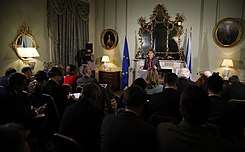
The SNP went on to achieve its best ever European Parliament result in the final election before Brexit, the party taking its MEP total to 3 or half of Scottish seats and achieving a record vote share for the party. This was also the best performance of any party in the era of proportional elections to the European Parliament in Scotland. This was suggested as being due to the party's europhile sentiment during what amounted to a single issue election, with parties hat lacked a clear message performing poorly, such as Labour finishing in 5th place and losing all of their Scottish MEPs for the first time.
Later that year the SNP experienced a surge in the 2019 general election, winning 45.0% of the vote and 48 seats, its second best result ever. Although the party suffered a loss to the Liberal Democrats, it gained the seat of its then UK leader Jo Swinson, along with 7 from the Conservatives and 6 from Labour. This victory was generally attributed to Sturgeon's cautious approach regarding holding a second independence referendum and strong emphasis on EU membership during the election.[55] Despite this, the UK-wide Conservative majority ensured that the UK left the EU the following January.
Constitution and structure
The local Branches are the primary level of organisation in the SNP. All of the Branches within each Scottish Parliament constituency form a Constituency Association, which coordinates the work of the Branches within the constituency, coordinates the activities of the party in the constituency, and acts as a point of liaison between an MSP or MP and the party. Constituency Associations are composed of delegates from all of the Branches within the constituency.
The annual National Conference is the supreme governing body of the SNP, and is responsible for determining party policy and electing the National Executive Committee. The National Conference is composed of:
- delegates from every Branch and Constituency Association
- the members of the National Executive Committee
- 15 members elected by the National Conference
- every SNP MSP and MP (and previously MEPs)
- a number of SNP local councillors, and
- delegates from one of the SNP's Affiliated Organisations (Young Scots for Independence, SNP Students, SNP Trade Union Group and the Association of Nationalist Councillors)
The National Council serves as the SNP's governing body between National Conferences, and its decisions are binding, unless rescinded or modified by the National Conference. There are also regular meetings of the National Assembly, which provides a forum for detailed discussion of party policy by party members.
The party has an active youth wing, the Young Scots for Independence, as well as a student wing, the Federation of Student Nationalists. There is also an SNP Trade Union Group. There is an independently owned monthly newspaper, The Scots Independent, which is highly supportive of the party.
The SNP's leadership is vested in its National Executive Committee (NEC), which is made up of the party's elected office bearers and six elected members (voted for at conference). The SNP parliamentarians (Holyrood and Westminster) and councillors have representation on the NEC, as do the Trade Union Group, the youth wing and the student wing.
National Executive Committee
The National Executive Committee is composed of:
- President: Ian Hudghton
- Leader: Nicola Sturgeon MSP (Glasgow Southside)
- Depute Leader: Keith Brown MSP (Clackmannanshire and Dunblane)
- National Treasurer: Colin Beattie MSP (Midlothian North and Musselburgh)
- National Secretary: Dr Angus MacLeod
- Business Convener: Kirsten Oswald MP (East Renfrewshire)
- Organisation Convener: Stacy Bradley
- Member Support Convener: Doug Daniel
- Policy Development Convener: Alyn Smith MP (Stirling)
- Local Government Convener: Cllr Ellen Forson (Clackmannanshire South)
- Women's Convener: Cllr Rhiannon Spear (Greater Pollok)
- Equalities Convener: Fiona Robertson
- Black, Asian and Minority Ethnic Convener: Cllr Graham Campbell (Springburn/Robroyston)
- Disabled Members' Convener: Morag Fulton
- Tommy Sheppard MP (Edinburgh East)
- Alison Thewliss MP (Glasgow Central)
- Sixteen regional representatives
- Representatives from the Association of Nationalist Councillors and affiliated organisations
Membership
Since 18 September 2014 (the day of the Scottish independence referendum), party membership has more than quadrupled (from 25,642), surpassing the Liberal Democrats and, briefly, Conservatives to become the second-largest political party in the United Kingdom in terms of membership.[56] As of August 2018, the Party has 125,482 members.
European affiliation
The SNP retains close links with Plaid Cymru, its counterpart in Wales. MPs from both parties co-operate closely with each other and work as a single parliamentary group within the House of Commons. Both the SNP and Plaid Cymru are members of the European Free Alliance (EFA), a European political party comprising regionalist political parties. The EFA co-operates with the larger European Green Party to form The Greens–European Free Alliance (Greens/EFA) group in the European Parliament.
Prior to its affiliation with The Greens–European Free Alliance, the SNP had previously been allied with the European Progressive Democrats (1979–1984), Rainbow Group (1989–1994) and European Radical Alliance (1994–1999).
As the UK is no longer a member of the EU, the SNP has no MEPs.
Policies
Ideological foundations
The Scottish National Party did not have a clear ideological position until the 1970s, when it sought to explicitly present itself as a social democratic party in terms of party policy and publicity.[57][58] During the period from its foundation until the 1960s, the SNP was essentially a moderate centrist party.[57] Debate within the party focused more on the SNP being distinct as an all-Scotland national movement, with it being neither of the left nor the right, but constituting a new politics that sought to put Scotland first.[58][59]
The SNP was formed through the merger of the centre-left National Party of Scotland (NPS) and the centre-right Scottish Party.[58] The SNP's founders were united over self-determination in principle, though not its exact nature, or the best strategic means to achieve self-government. From the mid-1940s onwards, SNP policy was radical and redistributionist in relation to land and in favour of ‘the diffusion of economic power’, including the decentralisation of industries such as coal to include the involvement of local authorities and regional planning bodies to control industrial structure and development.[57] Party policies supported the economic and social policy status quo of the post-war welfare state.[57][60]
By the 1960s, the SNP was starting to become defined ideologically, with a social democratic tradition emerging as the party grew in urban, industrial Scotland, and its membership experienced an influx of social democrats from the Labour Party, the trade unions and the Campaign for Nuclear Disarmament.[61][62] The emergence of Billy Wolfe as a leading figure in the SNP also contributed to the leftwards shift. By this period, the Labour Party were also the dominant party in Scotland, in terms of electoral support and representation. Targeting Labour through emphasising left-of-centre policies and values was therefore electorally logical for the SNP, as well as tying in with the ideological preferences of many new party members.[62] In 1961, the SNP conference expressed the party's opposition to the siting of the US Polaris submarine base at the Holy Loch. This policy was followed in 1963 by a motion opposed to nuclear weapons: a policy that has remained in place ever since.[63] The 1964 policy document, SNP & You, contained a clear centre-left policy platform, including commitments to full employment, government intervention in fuel, power and transport, a state bank to guide economic development, encouragement of cooperatives and credit unions, extensive building of council houses (social housing) by central and local government, pensions adjusted to cost of living, a minimum wage and an improved national health service.[57]
The 1960s also saw the beginnings of the SNP's efforts to establish an industrial organisation and mobilise amongst trade unionists in Scotland, with the establishment of the SNP Trade Union Group, and identifying the SNP with industrial campaigns, such as the Upper-Clyde Shipbuilders Work-in and the attempt of the workers at the Scottish Daily Express to run as a co-operative.[57] For the party manifestos for the two 1974 general elections, the SNP finally self-identified as a social democratic party, and proposed a range of social democratic policies.[64][65] There was also an unsuccessful proposal at the 1975 party conference to rename the party as the Scottish National Party (Social Democrats).[66] In the UK wide referendum on Britain’s membership of the European Economic Community (EEC) in the same year as the aforementioned attempted name change, the SNP campaigned for Britain to leave the EEC.[67][68]
There were further ideological and internal struggles after 1979, with the 79 Group attempting to move the SNP further to the left, away from being what could be described a "social-democratic" party, to an expressly "socialist" party. Members of the 79 Group - including future party leader and First Minister Alex Salmond - were expelled from the party. This produced a response in the shape of the Campaign for Nationalism in Scotland from those who wanted the SNP to remain a "broad church", apart from arguments of left vs. right. The 1980s saw the SNP further define itself as a party of the political left, such as campaigning against the introduction of the poll tax in Scotland in 1989; one year before the tax was imposed on the rest of the UK.[57]
Ideological tensions inside the SNP are further complicated by arguments between the so-called SNP gradualists and SNP fundamentalists. In essence, gradualists seek to advance Scotland to independence through further devolution, in a "step-by-step" strategy. They tend to be in the moderate left grouping, though much of the 79 Group was gradualist in approach. However, this 79 Group gradualism was as much a reaction against the fundamentalists of the day, many of whom believed the SNP should not take a clear left or right position.[57]
Economic policies
With the SNP's policy base being mostly in the mainstream Western European social democratic tradition, the party is committed to policies such as progressive personal taxation. This vision was achieved by the Sturgeon Government in 2017, reducing income tax rates for a slight majority of the population by shifting the tax burden to the wealthier.[69] Previously the party had replaced the flat rate Stamp Duty with the LBTT, which is founded on progressive principles.[70] Whilst in government, the party was also responsible for the establishment of Revenue Scotland to administer devolved taxation.
Having previously defined itself in opposition to the poll tax[57] the SNP has also championed progressive taxation at a local level. Despite pledging to introduce a local income tax[71] the Salmond Government found itself unable to replace the council tax and the party has, particularly since the ending of the council tax freeze[72] under Nicola Sturgeon's leadership, committing to increasing the graduated nature of the tax.[73] Conversely, the party has also supported capping and reducing Business Rates in an attempt to support small businesses.[74]
Social policies
_(27057921420).jpg)
The SNP can be seen to be at the heart of the secularisation[75] and liberalisation of Scotland with the party achieving the legalisation of same sex marriage in 2014,[76] indeed under Sturgeon's leadership Scotland was twice in succession named the best country in Europe for LGBTI legal equality.[77] Party policy aims to introduce gender self-identification[78] to allow an easier process of gender recognition for transgender community.[79] This is in stark contrast to Scotland's recent history as a deeply socially conservative country[80] although this transformation can be seen to have taken place in the country's other main political parties largely simultaneously.[81][82]
Particularly since Nicola Sturgeon's elevation to First Minister the party has highlighted its commitments to gender equality - with her first act being to appoint a gender balanced cabinet.[83] The SNP have also taken steps to implement all-women shortlists whilst Stugeon has introduced a mentoring scheme[84] to encourage women's political engagement.[85]
Stressing that their brand of nationalism is civic nationalism, the SNP are keen to show their support for multiculturalism[86] with Scotland receiving thousands of refugees from the Syrian Civil War.[87] To this end it has been claimed that refugees in Scotland are better supported than those in England.[88] More generally, the SNP take a liberal stance on immigration, seeking to increase numbers to combat a declining population[89] and calling for a separate Scottish visa even within the UK.[90]
Foreign and defence policies
.jpg)
Despite traditionally supporting military neutrality[91] the SNP's policy has in recent years moved to support both the Atlanticist and Europeanist traditions. This is particularly evident in the conclusion of the NATO debate within the party in favour of those who support membership of the military alliance.[92] This is despite the party's continuing opposition to Scotland hosting nuclear weapons and then-leader Salmond's criticism of both the Kosovo intervention[93] and the Iraq War.[94] The party has placed an emphasis on developing positive relations with the United States in recent years[95] despite a lukewarm reaction to the election of Scottish American Donald Trump as President due to long running legal disputes.[96]
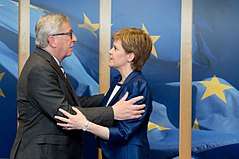
Having opposed membership in the 1975 referendum, the party has supported membership of the European Union since the adoption of the Independence in Europe policy during the 1980s. Consequentially, the SNP supported remaining within the EU during the 2016 referendum where every Scottish council area backed this position.[97] Consequently, the party opposed Brexit and sought a people's vote on the withdrawal agreement[98], ultimately unsuccessfully. Indeed, the SNP would like to see an independent Scotland as a member of the European Union and NATO[99] and has left open the prospect of an independent Scotland joining the Euro.[100]
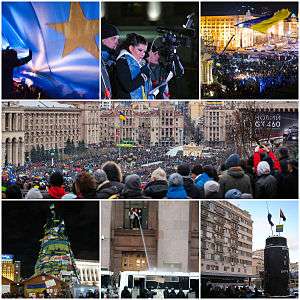
The SNP have also taken a stance against Russian interference abroad, the party supporting the enlargement of the EU and NATO to areas such as the Western Balkans and Ukraine to counter this influence.[101][102] Indeed, the party has called for repercussions regarding the poisoning of Sergei and Yulia Skripal[103] and has criticised former leader Alex Salmond for broadcasting a chat show on Kremlin-backed[104] network RT.[105] Consequently, party representatives have expressed support for movements such as Euromaidan that support the independence of countries across Eastern Europe.[106]
The party have supported measures including foreign aid which seek to facilitate international development[107] through various charitable orginisations.[108] In recognition of Scotland's historic links to the country, these programmes are mostly focused in Malawi[109] in common with previous Scottish governments. With local authorities across the country, including Glasgow City Council being involved in this partnership since before the SNP took office in 2007.[110]
Health and education policies

The SNP have pledged to uphold the public service nature of NHS Scotland and are consequently opposed to any attempts at privatisation of the health service,[111] including any inclusion in a post-Brexit trade deal with the United States. The party has been fond of increasing provision under the NHS with the introduction of universal baby boxes based on the Finnish scheme.[112] This supported child development alongside other commitments including the expansion of free childcare for children younger than school age and the introduction of universal free school meals in the first three years of school.[113]
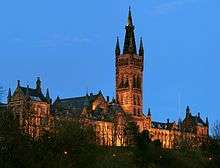
Previously, SNP governments have abolished hospital parking charges[114] as well as prescription charges[115] in efforts to promote enhanced public health outcomes by increasing access to care and treatment. Furthermore, during Sturgeon's premiership, Scotland became the first country in the world to introduce alcohol minimum unit pricing to counter alcohol problems.[116] Recently, the party has also committed to providing universal access to sanitary products[117] and the liberalisation of drugs policy[118] through devolution, in an effort to increase access to treatment and improve public health outcomes.
The party also promotes universal access to education, with one of the first acts of the Salmond government being to abolish tuition fees.[119] More cently, the party has turned its attention to widening access to higher education[120] with Nicola Sturgeon stating that education is her number one priority.[121] At school level, the Curriculum for Excellence is currently undergoing a review.[122]
Constitution policies
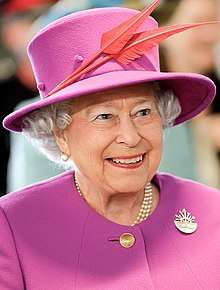
The foundations of the SNP are a belief that Scotland would be more prosperous by being governed independently from the United Kingdom, although the party was defeated in the 2014 referendum on this issue.[123] The party has since sought to hold a second referendum at some point in the future, perhaps related to the outcome of Brexit,[124] as the party sees a referendum as the only route to independence. The party is constitutionalist and as such rejects holding such a referendum unilaterally or any course of actions that could lead to comparisons with cases such as Catalonia[125] with the party seeing independence as a process that should be undertaken through a consensual process alongside the UK Government. As part of this process towards independence, the party supports increased devolution to the Scottish Parliament and the Scottish Government, particularly in areas such as welfare and immigration.[126]
Official SNP policy is supportive of the monarchy however members are divided on the issue. The party does propose reducing the funds spent on the royal family. [127] Separately, the SNP has always opposed the UK's unelected upper house and would like to see both it and the House of Commons elected by a form of proportional representation.[128] The party also supports the introduction of a written constitution, either for an independent Scotland or the UK as a whole,[129] going as far as producing a proposed interim constitution for Scotland during the independence referendum campaign.[130]
Fundamentalists and gradualists
In relation to how to achieve independence the party was traditionally split between fundamentalists and gradualists.
The SNP leadership generally subscribe to the gradualist viewpoint, that being the idea that Scottish independence can be won by the accumulation by the Scottish Parliament of powers that the UK Parliament currently has over a protracted period of time. It is also a philosophy that emphasises the election of an SNP government should bring about trust in the Scottish people in the ability of Scotland to govern herself, thus bringing increased support for independence.
Fundamentalism stands in opposition to the so-called gradualist point of view, which believes that the SNP should emphasise independence more widely in order to achieve it. The argument goes that if the SNP is unprepared to argue for its central policy then it is unlikely ever to persuade the public of its worthiness.[131]
Leadership
Leader of the Scottish National Party
| Leader of the Scottish National Party | ||||
|---|---|---|---|---|
| Leader (birth-death) |
Portrait | Political Office | Took Office | Left Office |
| Sir Alexander MacEwen (1875-1941) |
 |
Provost of Inverness (1925-1931) Councillor for Benbecula (1931-1941)[132] |
7 April 1934 | 1936 |
| Andrew Dewar Gibb (1888-1974) |
 |
Candidate for Combined Scottish Universities (1936, 1938) | 1936 | 1940 |
| William Power (1873-1951) |
 |
Candidate for Argyllshire (1940) | 1940 | 30 May 1942 |
| Douglas Young (1913-1973) |
 |
Candidate for Kirkcaldy Burghs (1944) | 30 May 1942 | 9 June 1945 |
| Prof Bruce Watson (1910-1988) |
 |
9 June 1945 | May 1947 | |
| Dr Robert McIntyre (1913-1998) |
 |
MP for Motherwell (1945) Provost of Stirling (1967-1975) Councillor for Stirling (1956-1975) |
May 1947 | June 1956 |
| James Halliday (1927-2013) |
 |
Candidate for Stirling and Falkirk (1959) | June 1956 | 5 June 1960 |
| Arthur Donaldson (1901-1993) |
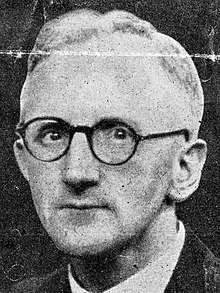 |
Councillor for Angus (1946-1955) Councillor for Forfar (1945-1968) |
5 June 1960 | 1 June 1969 |
| William Wolfe (1924-2010) |
.gif) |
Candidate for West Lothian (1970-79) | 1 June 1969 | 15 September 1979 |
| Gordon Wilson (1938-2017) |
 |
MP for Dundee East (1974-1987) | 15 September 1979 | 22 September 1990 |
| The Right Hon. Alex Salmond (b. 1954) (1st Term) |
.jpg) |
MP for Banff and Buchan (1987-2010) MSP for Banff and Buchan (1999-2001) |
22 September 1990 | 26 September 2000 |
| John Swinney (b. 1964) |
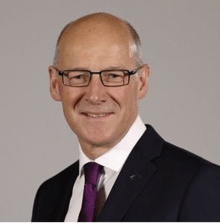 |
Deputy First Minister (since 2014) MSP for Perthshire North (since 2011) MSP for North Tayside (1999-2011) MP for North Tayside (1997-2001) |
26 September 2000 | 3 September 2004 |
| The Right Hon. Alex Salmond (b. 1954) (2nd Term) |
.jpg) |
First Minister (2007-2014) MSP for Aberdeenshire East (2011-2016) MSP for Gordon (2007-2011) MP for Gordon (2015-2017) |
3 September 2004 | 14 November 2014 |
| The Right Hon. Nicola Sturgeon (b. 1970) |
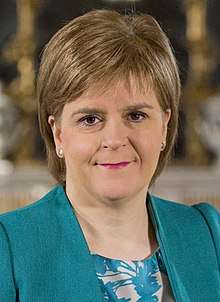 |
First Minister (since 2014) MSP for Glasgow Southside (since 2011) MSP for Glasgow Govan (2007-2011) MSP for Glasgow (1999-2007) |
14 November 2014 | Incumbent |
Depute Leader of the Scottish National Party
| Depute Leader of the Scottish National Party | ||||
|---|---|---|---|---|
| Depute Leader (birth-death) |
Portrait | Political Office | Took Office | Left Office |
| Sandy Milne (b. 1920) |
 |
Councillor for Stirling (1950s) | 17 May 1964[133] | 5 June 1966[134] |
| William Wolfe (1924-2010) |
.gif) |
Candidate for West Lothian (1966) | 5 June 1966[134] | 1 June 1969 |
| George Leslie (b. 1936) |
 |
Councillor for Calderwood/St Leonards (1974-1978) | 1 June 1969 | 30 May 1971[135] |
| Douglas Henderson (1935-2006) (1st Term) |
 |
MP for East Aberdeenshire (1974-1979) | 30 May 1971[135] | 3 June 1973[136] |
| Gordon Wilson (1938-2017) |
 |
MP for Dundee East (1974-1987) | 3 June 1973[136] | 2 June 1974[137] |
| Margo MacDonald (1943-2014) |
 |
MSP for Lothian (1999-2014) MP for Glasgow Govan (1973-1974) |
2 June 1974[137] | 15 September 1979[138] |
| Douglas Henderson (1935-2006) (2nd Term) |
 |
MP for East Aberdeenshire (1974-1979) | 15 September 1979[138] | 30 May 1981[139] |
| Jim Fairlie (b. 1940) |
 |
Candidate for Dunfermline West (1983) | 30 May 1981[139] | 15 September 1984[140] |
| Margaret Ewing (1945-2006) |
 |
MSP for Moray (1999-2006) MP for Moray (1987-2001) MP for East Dunbartonshire (1974-1979) |
15 September 1984[140] | 26 September 1987[141] |
| The Right Hon. Alex Salmond (b. 1954) |
.jpg) |
MP for Banff and Buchan (1987-2010) | 26 September 1987[141] | 22 September 1990 |
| Alasdair Morgan (b. 1945) |
 |
MSP for South of Scotland (2003-2011) MSP for Galloway and Upper Nithsdale (1999-2003) MP for Galloway and Upper Nithsdale (1997-2001) |
22 September 1990 | 22 September 1991[142] |
| Jim Sillars (b. 1937) |
 |
MP for Glasgow Govan (1988-1992) MP for South Ayrshire (1970-1979) |
22 September 1991[142] | 25 September 1992[143] |
| Allan Macartney (1941-1998) |
 |
MEP for North East Scotland (1994-1998) | 25 September 1992[143] | 25 August 1998[144] |
| John Swinney (b. 1964) |
 |
MSP for North Tayside (1999-2011) MP for North Tayside (1997-2001) |
25 August 1998[144] | 26 September 2000 |
| Roseanna Cunningham (b. 1951) |
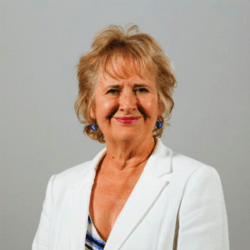 |
MSP for Perthshire South and Kinross-shire (since 2011) MSP for Perth (1999-2011) MP for Perth (1997-2001) MP for Perth and Kinross (1995-1997) |
26 September 2000 | 3 September 2004 |
| The Right Hon. Nicola Sturgeon (b. 1970) |
 |
Deputy First Minister (2007-2014) MSP for Glasgow Southside (since 2011) MSP for Glasgow Govan (2007-2011) MSP for Glasgow (1999-2007) |
3 September 2004 | 14 November 2014 |
| Stewart Hosie (b. 1963) |
 |
MP for Dundee East (since 2005) | 14 November 2014 | 13 October 2016 |
| The Right Hon. Angus Robertson (b. 1969) |
.jpg) |
MP for Moray (2001-2017) | 13 October 2016 | 8 June 2018 |
| Keith Brown (b. 1961) |
 |
MSP for Clackmannanshire and Dunblane (since 2011) MSP for Ochil (2007-2011) Leader of Clackmannanshire Council (2003-2007) Councillor for Alva (1999-2007) |
8 June 2018 | Incumbent |

President of the Scottish National Party
- James Graham, 6th Duke of Montrose and Robert Bontine Cunninghame Graham (joint), 1934–1936
- Roland Muirhead, 1936–1950
- Tom Gibson, 1950–1958
- Robert McIntyre, 1958–1980
- William Wolfe, 1980–1982
- Donald Stewart, 1982–1987
- Winnie Ewing, 1987–2005
- Ian Hudghton, 2005–present
National Secretary of the Scottish National Party
- John MacCormick, 1934–1942
- Robert McIntyre, 1942–1947
- Mary Fraser Dott, 1947–1951
- Robert Curran, 1951–1954
- John Smart, 1954–1963
- Malcolm Shaw, 1963–1964
- Gordon Wilson, 1964–1971
- Muriel Gibson, 1971–1972
- Rosemary Hall, 1972–1975
- Muriel Gibson, 1975–1977
- Chrissie MacWhirter, 1977–1979
- Iain Murray, 1979–1981
- Neil MacCallum, 1981–1986
- John Swinney, 1986–1992
- Alasdair Morgan, 1992–1997
- Stewart Hosie, 1999–2003
- Alasdair Allan, 2003–2006
- Duncan Ross, 2006–2012
- Patrick Grady, 2012–2016
- Dr Angus MacLeod, 2016–present
Leader of the parliamentary party, Scottish Parliament
- Alex Salmond (Banff and Buchan), 1999–2000
- John Swinney (North Tayside), 2000–2004
- Nicola Sturgeon (Glasgow), 2004–2007
- Alex Salmond (Aberdeenshire East), 2007–2014
- Nicola Sturgeon (Glasgow Southside) 2014–present

Leader of the parliamentary party, House of Commons
- Donald Stewart (Western Isles), 1974–1987
- Margaret Ewing (Moray), 1987–1999
- Alasdair Morgan (Galloway and Upper Nithsdale), 1999–2001
- Alex Salmond (Banff and Buchan), 2001–2007
- Angus Robertson (Moray), 2007–2017
- Ian Blackford (Ross, Skye and Lochaber), 2017–present
Chief Executive Officer
- Michael Russell, 1994–1999
- Peter Murrell, 2007–present
Current SNP Council Leaders
- Clackmannanshire: Les Sharp (Clackmannanshire West), since 2017
- Dundee City: John Alexander (Strathmartine), since 2017
- East Ayrshire: Douglas Reid (Kilmarnock West and Crosshouse), since 2007
- East Renfrewshire: Tony Buchanan (Newton Mearns North and Neilston), since 2017
- City of Edinburgh: Adam McVey (Leith), since 2017
- Falkirk: Cecil Meiklejohn (Falkirk North), since 2017
- Fife: David Alexander (Leven, Kennoway and Largo), since 2017
- Glasgow City: Susan Aitken (Langside), since 2017
- Moray: Graham Leadbitter (Elgin South), since 2018
- Renfrewshire: Iain Nicolson (Erskine and Inchinnan), since 2017
- South Ayrshire: Douglas Campbell (Ayr North), since 2017
- South Lanarkshire: John Ross (Hamilton South), since 2017
- Stirling: Scott Farmer (Stirling West), since 2017
- West Dunbartonshire: Jonathon McColl (Lomond), since 2017
Government Ministers and Shadow Cabinet
Scottish Parliament
As of February 2019, the Cabinet of the Scottish Government is as follows:
House of Commons
As of January 2020, the Shadow Cabinet of the SNP in Westminster was as follows.[146]
| Portfolio | Shadow Secretary/Minister | Image |
|---|---|---|
| Westminster Leader | The Right Hon. Ian Blackford MP (Ross, Skye and Lochaber) |
 |
| Westminster Deputy Leader | Kirsty Blackman MP (Aberdeen North) |
 |
| Shadow Chancellor | Alison Thewliss MP (Glasgow Central) |
 |
| Shadow Foreign Secretary | Alyn Smith MP (Stirling) |
 |
| Shadow Secretary of State for Health and Social Care Shadow Secretary of State for Exiting the EU |
Dr Philippa Whitford MP (Central Ayrshire) |
 |
| Shadow Secretary of State for Culture, Media and Sport | John Nicolson MP (Ochil and South Perthshire) |
 |
| Shadow Secretary of State for Scotland | Mhairi Black MP (Paisley and Renfrewshire South) |
 |
| Shadow Secretary of State for Northern Ireland and Wales | Kirsten Oswald MP (East Renfrewshire) |
|
| Shadow Secretary of State for Housing, Communities and Local Government | David Linden MP (Glasgow East) |
 |
| Shadow Minister for Women and Equalities | Anne McLaughlin MP (Glasgow North East) |
 |
| Shadow Home Secretary Shadow Justice Secretary |
Joanna Cherry QC MP (Edinburgh South West) |
 |
| Shadow Secretary of State for International Trade | Stewart Hosie MP (Dundee East) |
 |
| Shadow Secretary of State for Business, Energy and Industrial Strategy | Drew Hendry MP (Inverness, Nairn, Badenoch and Strathspey) |
 |
| Shadow Secretary of State for Work and Pensions | Neil Gray MP (Airdrie and Shotts) |
 |
| Shadow Defence Secretary | Stewart McDonald MP (Glasgow South) |
 |
| Shadow Attorney General and Shadow Minister for Immigration | Stuart McDonald MP (Cumbernauld, Kilsyth and Kirkintilloch East) |
 |
| Shadow Secretary of State for Transport | Gavin Newlands MP (Paisley and Renfrewshire North) |
 |
| Shadow Secretary of State for Education Shadow Minister for Military Personnel and Veterans |
Carol Monaghan MP (Glasgow North West) |
 |
| Shadow Secretary of State for International Development | Chris Law MP (Dundee West) |
 |
| Shadow Secretary of State for the Environment, Food and Rural Affairs | Deidre Brock MP (Edinburgh North and Leith) |
 |
| Shadow Chancellor of the Duchy of Lancaster Shadow Minister for the Cabinet Office |
Pete Wishart MP (Perth and North Perthshire) |
 |
| Shadow Leader of the House of Commons | Tommy Sheppard MP (Edinburgh East) |
 |
Present elected representatives
Members of the Scottish Parliament
Members of Parliament
Councillors
The SNP had 431 councillors in Local Government elected from the 2017 Scottish local elections.
Electoral performance
Scottish Parliament
| Year[147] | Leader | Regional Members | Constituency Members | Total seats | Change | Position | Government | ||
|---|---|---|---|---|---|---|---|---|---|
| % | Seats | % | Seats | ||||||
| 1999 | Alex Salmond MSP for Banff and Buchan |
27.3% | 28 / 56 |
28.7% | 7 / 73 |
35 / 129 |
Labour–Lib Dem coalition | ||
| 2003 | John Swinney MSP for North Tayside |
20.9% | 18 / 56 |
23.7% | 9 / 73 |
27 / 129 |
Labour–Lib Dem coalition | ||
| 2007 | Alex Salmond MSP for Gordon (2007) MSP for Aberdeenshire East (2011) |
31.0% | 26 / 56 |
32.9% | 21 / 73 |
47 / 129 |
SNP minority | ||
| 2011 | 44.0% | 16 / 56 |
45.4% | 53 / 73 |
69 / 129 |
SNP majority | |||
| 2016 | Nicola Sturgeon MSP for Glasgow Southside |
41.7% | 4 / 56 |
46.5% | 59 / 73 |
63 / 129 |
SNP minority | ||
House of Commons
| Election[147] | Leader | Votes |
Seats |
Position | Government | |||
|---|---|---|---|---|---|---|---|---|
| # | % | # | ± | |||||
| 1935 | Sir Alexander MacEwen Candidate in Western Isles |
29,517 | 1.1 | 0 / 71 |
N/A | |||
| 1945 | Douglas Young Candidate in Kirkcaldy Burghs |
26,707 | 1.2 | 0 / 71 |
N/A | |||
| 1950 | Robert McIntyre Candidate in Motherwell (1950) Candidate in Perth and East Perthshire (1951 and 55) |
9,708 | 0.4 | 0 / 71 |
N/A | |||
| 1951 | 7,299 | 0.3 | 0 / 71 |
N/A | ||||
| 1955 | 12,112 | 0.5 | 0 / 71 |
N/A | ||||
| 1959 | Jimmy Halliday Candidate in Stirling and Falkirk |
21,738 | 0.5 | 0 / 71 |
N/A | |||
| 1964 | Arthur Donaldson Candidate in Kinross and Western Perthshire |
64,044 | 2.4 | 0 / 71 |
N/A | |||
| 1966 | 128,474 | 5.0 | 0 / 71 |
N/A | ||||
| 1970 | William Wolfe Candidate in West Lothian |
306,802 | 11.4 | 1 / 71 |
Opposition | |||
| February 1974 | 633,180 | 21.9 | 7 / 71 |
Opposition | ||||
| October 1974 | 839,617 | 30.4 | 11 / 71 |
Opposition | ||||
| 1979 | 504,259 | 17.3 | 2 / 71 |
Opposition | ||||
| 1983 | Gordon Wilson MP for Dundee East |
331,975 | 11.7 | 2 / 72 |
Opposition | |||
| 1987 | 416,473 | 14.0 | 3 / 72 |
Opposition | ||||
| 1992 | Alex Salmond MP for Banff and Buchan |
629,564 | 21.5 | 3 / 72 |
Opposition | |||
| 1997 | 621,550 | 22.1 | 6 / 72 |
Opposition | ||||
| 2001 | John Swinney MSP for North Tayside |
464,314 | 20.1 | 5 / 72 |
Opposition | |||
| 2005 | Alex Salmond MP for Banff and Buchan (2005) MSP for Gordon (2010) |
412,267 | 17.7 | 6 / 59 |
Opposition | |||
| 2010 | 491,386 | 19.9 | 6 / 59 |
Opposition | ||||
| 2015 | Nicola Sturgeon MSP for Glasgow Southside |
1,454,436 | 50.0 | 56 / 59 |
Opposition | |||
| 2017 | 959,090 | 36.9 | 35 / 59 |
Opposition | ||||
| 2019 | 1,242,380 | 45.0 | 48 / 59 |
Opposition | ||||
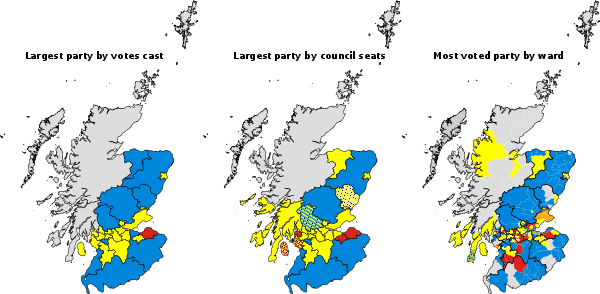
Local councils
| Year[147] | Votes | Seats won | Notes | |
|---|---|---|---|---|
| FPv% | Position | |||
| 1995 | 26.1% | 181 / 1,222 | ||
| 1999 | 28.9% | 201 / 1,222 | ||
| 2003 | 24.1% | 171 / 1,222 | ||
| 2007 | 29.7% | 363 / 1,222 | Single transferable vote introduced. | |
| 2012 | 32.3% | 425 / 1,223 | ||
| 2017 | 32.3% | 431 / 1,227 | ||
Results by council (2017)
| Council | Votes | Seats won | Administration | |
|---|---|---|---|---|
| FPv% | Position | |||
| Aberdeen City | 32.6% | 19 / 45 |
Opposition | |
| Aberdeenshire | 28.4% | 21 / 70 |
Opposition | |
| Angus | 31.2% | 9 / 28 |
Opposition | |
| Argyll and Bute | 27.7% | 11 / 36 |
Opposition | |
| Clackmannanshire | 37.2% | 8 / 18 |
SNP minority | |
| Dumfries and Galloway | 21.6% | 11 / 43 |
SNP-Labour coalition | |
| Dundee City | 41.3% | 14 / 29 |
SNP-Independent coalition | |
| East Ayrshire | 38.5% | 14 / 32 |
SNP minority | |
| East Dunbartonshire | 29.2% | 7 / 22 |
SNP minority (2017-2018) | |
| Opposition (since 2018) | ||||
| East Lothian | 27.9% | 6 / 22 |
Opposition | |
| East Renfrewshire | 24.3% | 5 / 18 |
SNP-Labour coalition | |
| City of Edinburgh | 27.0% | 19 / 63 |
SNP-Labour coalition | |
| Falkirk | 38.8% | 12 / 30 |
SNP-Independent coalition | |
| Fife | 33.6% | 29 / 75 |
SNP-Labour coalition | |
| Glasgow City | 41.0% | 39 / 85 |
SNP minority | |
| Highland | 24.9% | 22 / 74 |
Opposition | |
| Inverclyde | 32.8% | 7 / 22 |
Opposition | |
| Midlothian | 30.7% | 6 / 18 |
Opposition | |
| Moray | 31.6% | 9 / 26 |
Opposition (2017-2018) | |
| SNP minority (since 2018) | ||||
| Na h-Eileanan Siar | 19.2% | 7 / 31 |
Opposition | |
| North Ayrshire | 35.2% | 11 / 33 |
Opposition | |
| North Lanarkshire | 38.5% | 33 / 77 |
Opposition | |
| Orkney | 0.0% | 0 / 21 |
Opposition | |
| Perth and Kinross | 31.2% | 15 / 40 |
Opposition | |
| Renfrewshire | 37.6% | 19 / 43 |
SNP minority | |
| Scottish Borders | 21.4% | 9 / 34 |
Opposition | |
| Shetland | 0.0% | 1 / 22 |
Opposition | |
| South Ayrshire | 30.2% | 9 / 28 |
SNP-Labour-Independent coalition | |
| South Lanarkshire | 35.7% | 27 / 64 |
SNP minority | |
| Stirling | 34.8% | 9 / 23 |
SNP-Labour coalition | |
| West Dunbartonshire | 40.1% | 10 / 22 |
SNP-Independent coalition | |
| West Lothian | 37.3% | 13 / 33 |
Opposition | |
European Parliament (1979–2020)
.svg.png)
| Election[147] | Party Group | Votes |
Seats won | Notes | |||
|---|---|---|---|---|---|---|---|
| % | Position | ||||||
| 1979 | EPD | 19.4% | 1 / 8 | ||||
| 1984 | EDA | 1 / 8 | |||||
| 1989 | RBW | 1 / 8 | |||||
| 1994 | ERA | 2 / 8 | |||||
| 1999 | G-EFA | 2 / 8 | Proportional representation introduced. | ||||
| 2004 | 2 / 7 | ||||||
| 2009 | 2 / 6 | ||||||
| 2014 | 2 / 6 | ||||||
| 2019 | 3 / 6 | Last European election before Brexit. | |||||

Two-tier local councils (1975–1996)
| District Councils | Regional and Island Councils | ||||||||
|---|---|---|---|---|---|---|---|---|---|
| Year[147] | Votes | Seats won | Councils won | Year[147] | Votes | Seats won | Councils won | ||
| % | Position | % | Position | ||||||
| 1974 | 12.4% | 62 / 1,158 |
1 / 53 |
1974 | 12.6% | 18 / 524 |
0 / 12 | ||
| 1977 | 24.2% | 170 / 1,158 |
5 / 53 |
1978 | 20.9% | 18 / 524 |
0 / 12 | ||
| 1980 | 15.5% | 54 / 1,158 |
0 / 53 |
1982 | 13.4% | 23 / 524 |
0 / 12 | ||
| 1984 | 11.7% | 59 / 1,158 |
1 / 53 |
1986 | 18.2% | 36 / 524 |
0 / 12 | ||
| 1988 | 21.3% | 113 / 1,158 |
1 / 53 |
1990 | 21.8% | 42 / 524 |
0 / 12 | ||
| 1992 | 24.3% | 150 / 1,158 |
1 / 53 |
1994 | 26.8% | 73 / 453 |
0 / 12 | ||
See also
References
- Keen, Richard; Audickas, Lukas (3 September 2018). "Membership of UK Political Parties" (PDF). www.parliament.uk. House of Commons Library. p. 12. Archived (PDF) from the original on 30 September 2017. Retrieved 30 September 2017.
The SNP membership rose from 118,162 in April 2018 to 125,482 in August 2018, according to information from the Party’s Central Office.
- Hassan, Gerry (2009), The Modern SNP: From Protest to Power, Edinburgh University Press, pp. 5, 9
- Christopher Harvie (2004). Scotland and Nationalism: Scottish Society and Politics, 1707 to the Present. Psychology Press. ISBN 978-0-415-32724-4. Archived from the original on 24 April 2016. Retrieved 25 November 2015.
- Frans Schrijver (2006). Regionalism After Regionalisation: Spain, France and the United Kingdom. Amsterdam University Press. pp. 261–290. ISBN 978-90-5629-428-1. Archived from the original on 1 May 2016. Retrieved 25 November 2015.
- Lynn Bennie (2017). "The Scottish National Party: Nationalism for the many". In Oscar Mazzoleni; Sean Mueller (eds.). Regionalist Parties in Western Europe: Dimensions of Success. Taylor & Francis. pp. 22–41. ISBN 978-1-317-06895-2.
- "About Us". Archived from the original on 13 September 2015.
- Eve Hepburn (18 October 2013). New Challenges for Stateless Nationalist and Regionalist Parties. Routledge. p. 9. ISBN 978-1-317-96596-1. Archived from the original on 2 May 2016. Retrieved 25 November 2015.
- Bob Lingard (24 July 2013). Politics, Policies and Pedagogies in Education: The Selected Works of Bob Lingard. Routledge. p. 120. ISBN 978-1-135-01998-3. Archived from the original on 10 May 2016. Retrieved 25 November 2015.
- "Anti-Brexit feeling expected to help SNP in European elections". Archived from the original on 15 May 2019. Retrieved 15 May 2019.
- Ari-Veikko Anttiroiko; Matti Mälkiä (2007). Encyclopedia of Digital Government. Idea Group Inc (IGI). p. 398. ISBN 978-1-59140-790-4. Archived from the original on 3 January 2014. Retrieved 18 July 2013.
- Josep M. Colomer (25 July 2008). Political Institutions in Europe. Routledge. p. 26. ISBN 978-1-134-07354-2. Archived from the original on 17 May 2016. Retrieved 25 November 2015.
- Ibpus.com; International Business Publications, USA (1 January 2012). Scotland Business Law Handbook: Strategic Information and Laws. Int'l Business Publications. p. 29. ISBN 978-1-4387-7095-6. Archived from the original on 25 April 2016. Retrieved 25 November 2015.
- A Nation Changed?: The SNP and Scotland Ten Years On Archived 1 May 2018 at the Wayback Machine. Edited by Gerry Hassan and Simon Barrow. Chapter author - Joyce McMillan. Published in 2017, in Glasgow, Scotland. Published by Bell and Bain Ltd. Retrieved via Google Books.
- BBC (2016). "Scotland Parliament election 2016". BBC News. Archived from the original on 27 November 2017. Retrieved 16 November 2017.
- "Local Council Political Compositions". Open Council Date UK. 24 October 2019. Archived from the original on 30 September 2017. Retrieved 24 October 2019.
- Amir Abedi (2004). Anti-political Establishment Parties: A Comparative Analysis. Psychology Press. p. 72. ISBN 978-0-415-31961-4. Archived from the original on 26 April 2016. Retrieved 25 November 2015.
- Political Systems of the World. Allied Publishers. p. 122. ISBN 978-81-7023-307-7. Archived from the original on 24 June 2016. Retrieved 25 November 2015.
- Michael O'Neill (22 May 2014). Devolution and British Politics. Routledge. p. 92. ISBN 978-1-317-87365-5. Archived from the original on 4 May 2016. Retrieved 25 November 2015.
- Gallardo, Cristina (27 November 2019). "Scottish National Party's manifesto explained". POLITICO. London. Retrieved 4 May 2020.
The SNP wants Scotland to become an independent country and stay in the European Union.
- Mitchell, James; Bennie, Lynn; Johns, Rob (2012), The Scottish National Party: Transition to Power, Oxford University Press, pp. 107–116
- Keating, Michael (2009), "Nationalist Movements in Comparative Perspective", The Modern SNP: From Protest to Power, Edinburgh University Press, pp. 214–217
- Heisey, Monica. "Making the case for an "aye" in Scotland". Alumni Review. Queen's University. Archived from the original on 5 May 2015. Retrieved 4 April 2015.
- Carrell, Severin (11 May 2011). "MSPs sworn in at Holyrood after SNP landslide". The Guardian. London. Archived from the original on 19 February 2014. Retrieved 12 July 2011.
- "Scotland local elections 2017". BBC News Online. Archived from the original on 2 September 2017. Retrieved 21 June 2018.
- "SNP maintains peerage opposition". BBC News. 22 September 2005. Archived from the original on 4 August 2017. Retrieved 21 August 2016.
- "House of Lords should be scrapped, says SNP". BBC News. 28 July 2015. Archived from the original on 11 May 2017. Retrieved 15 April 2017.
- Dinwoodie, Robbie (7 April 2014). "From radicals and Tartan Tories to the party of government". Herald Scotland. Archived from the original on 18 May 2015. Retrieved 10 July 2019.
- Mitchell, James; Hassan, Gerry (2016). Scottish National Party Leaders. London: Biteback. ISBN 978-1-7859-0092-1.
- "Dilemmas of Over-Development: Scottish Nationalism and the Future of the Union". Versobooks.com. Retrieved 5 April 2020.
- Faux, Ronald (4 May 1977). "Labour lose control of Glasgow". The Times, p. 1.
- Devine, T. M. (Thomas Martin) (5 July 2012). The Scottish nation : a modern history. London. ISBN 978-0-7181-9673-8. OCLC 1004568536.
- "Ex-MP: Scotland 'in trouble' if lax on constitution - The Targe". thetarge.co.uk. Retrieved 5 April 2020.
- "Former MP Dick Douglas dies aged 82". BBC News. 13 May 2014. Retrieved 5 April 2020.
- "Politics: Anti-bombing Salmond hits an all-time low with voters". The Independent. 13 April 1999. Retrieved 5 April 2020.
- Correspondent, Nick Britten, Scotland Political (17 July 2000). "Scramble to lead SNP as Salmond quits". ISSN 0307-1235. Retrieved 5 April 2020.
- "BBC NEWS | In Depth | Conferences | SNP | Emphatic SNP win for Swinney". news.bbc.co.uk. Retrieved 5 April 2020.
- "McLeish steps down". 8 November 2001. Retrieved 5 April 2020.
- "Euro poll was breaking point for Swinney". www.scotsman.com. Retrieved 5 April 2020.
- "Salmond named as new SNP leader". 3 September 2004. Retrieved 5 April 2020.
- "SNP and Greens sign working deal". BBC News Scotland. 11 May 2007. Archived from the original on 1 March 2014. Retrieved 16 March 2013.
- Taylor, Brian (23 January 2020). "Could the SNP do a budget deal with the Tories?". BBC News. Retrieved 5 April 2020.
- "SNP wins majority in Scottish elections". channel4.com. Archived from the original on 12 July 2011. Retrieved 12 July 2011.
- "Our Party". The SNP. Archived from the original on 9 June 2017. Retrieved 10 May 2017.
- "SNP votes to end anti-Nato policy". BBC News. 19 October 2012. Retrieved 5 April 2020.
- Dailyrecord.co.uk (19 February 2008). "Demand For Alex Salmond Apology Over Kosovo". dailyrecord. Retrieved 5 April 2020.
- "Alex Salmond resigns as first minister after Scotland rejects independence". The Guardian. 19 September 2014. Archived from the original on 3 April 2015. Retrieved 8 May 2015.
- Goldhill, Olivia (11 September 2014). "Alex Salmond's 'female problem' - or why most Scottish women wouldn't trust him to run a tea party". ISSN 0307-1235. Retrieved 5 April 2020.
- "Election 2015: SNP wins 56 of 59 seats in Scots landslide". BBC News. 8 May 2015. Archived from the original on 21 May 2015. Retrieved 8 May 2015.
- Association, Press (6 May 2017). "Local elections: Sturgeon plays down Tory success in Scotland". The Guardian. ISSN 0261-3077. Retrieved 5 April 2020.
- "Labour loses control of Glasgow City Council for the first time in 40 years". The Independent. 5 May 2017. Retrieved 5 April 2020.
- Johnson, Simon; Henderson, Barney (8 June 2017). "Scotland election results: Alex Salmond defeated and SNP suffer huge losses as Tory chances boosted north of the border". Telegraph. Archived from the original on 9 June 2017. Retrieved 9 June 2017.
- "General election 2017: SNP lose a third of seats amid Tory surge". BBC News. 9 June 2017. Archived from the original on 9 June 2017. Retrieved 9 June 2017.
- Thomas, Natalie; Dickie, Mure (8 June 2017). "Scottish election results strike blow to SNP plans for IndyRef2". Financial Times. Archived from the original on 11 June 2017. Retrieved 9 June 2017.
- "General election 2017: SNP lose a third of seats amid Tory surge". BBC. 9 June 2017. Archived from the original on 24 October 2018.
- "SNP wins election landslide in Scotland". BBC News. 13 December 2019. Retrieved 5 April 2020.
- "New figures show our party is now powered by 125,482 members - making @theSNP the second biggest party in the UK". Archived from the original on 24 May 2019. Retrieved 3 September 2018.
- Peter Lynch (2002). SNP: The History of the Scottish National Party. Welsh Academic Press.
- Jack Brand (1978). The National Movement in Scotland. Routledge and Kegan Paul. pp. 216–17.
- Jack Brand (1990). 'Scotland', in Watson, Michael (ed.), Contemporary Minority Nationalism. Routledge. p. 28.
- Gerry Hassan (2009). The Modern SNP: From Protest to Power. Edinburgh University Press. p. 120.
- Jack Brand (1990). 'Scotland', in Watson, Michael (ed.), Contemporary Minority Nationalism. Routledge. p. 32.
- James Mitchell (1996). Strategies for Self-government: The Campaigns for a Scottish Parliament. Polygon. p. 208.
- James Mitchell (1996). Strategies for Self-government: The Campaigns for a Scottish Parliament. Polygon. p. 194.
- Jack Brand (1990). 'Scotland', in Watson, Michael (ed.), Contemporary Minority Nationalism. Routledge. p. 27.
- Gerry Hassan (2009). The Modern SNP: From Protest to Power. Edinburgh University Press. p. 121.
- Eve Hepburn (18 October 2013). New Challenges for Stateless Nationalist and Regionalist Parties. Routledge. p. 143. ISBN 978-1-317-96596-1. Archived from the original on 3 May 2016. Retrieved 25 November 2015.
- Devenney, Andrew D. (2008). "Regional Resistance to European Integration: The Case of the Scottish National Party, 1961-1972". Historical Social Research / Historische Sozialforschung. 33 (3 (125)): 319–345. ISSN 0172-6404. JSTOR 20762312.
- Ley, Shaun (18 August 2016). "The dilemma facing Scotland's Eurosceptic nationalists". Retrieved 12 January 2020.
- "Scottish income tax changes unveiled". BBC News. 14 December 2017. Retrieved 10 April 2020.
- "New property tax comes into effect". BBC News. 1 April 2015. Retrieved 10 April 2020.
- Carrell, Severin; correspondent, Scotland (11 February 2009). "Alex Salmond drops flat-rate local income tax plan". The Guardian. ISSN 0261-3077. Retrieved 10 April 2020.
- "Nicola Sturgeon confirms end to council tax freeze as those living in more expensive homes face higher bills". Holyrood Website. 3 October 2019. Retrieved 10 April 2020.
- "MSPs vote to raise council tax bands". BBC News. 3 November 2016. Retrieved 10 April 2020.
- "Scottish business rate reforms confirmed". BBC News. 12 September 2017. Retrieved 10 April 2020.
- "Humanist weddings overtake Church of Scotland ceremonies". www.scotsman.com. Retrieved 10 April 2020.
- "Gay marriage law comes into effect". BBC News. 16 December 2014. Retrieved 10 April 2020.
- "Scotland tops Europe for LGBTI equality and human rights". www.scotsman.com. Retrieved 10 April 2020.
- "The Scottish government just confirmed the next step for the reformation of the Gender Recognition Act". PinkNews - Gay news, reviews and comment from the world's most read lesbian, gay, bisexual, and trans news service. 3 September 2019. Retrieved 5 April 2020.
- Farquharson, Kenny. "Wings Over Scotland independence blogger Stuart Campbell plans to take on SNP". ISSN 0140-0460. Retrieved 10 April 2020.
- MacNicol, David (27 July 2017). "Illegal to be gay - Scotland's history". BBC News. Retrieved 10 April 2020.
- Torrance, David (5 April 2016). "The tartan rainbow: why it's great to be gay in Scotland". The Guardian. ISSN 0261-3077. Retrieved 10 April 2020.
- Bennhold, Katrin (22 October 2016). "Scotland Embraces Gay Politicians in a Profound Cultural Shift". The New York Times. ISSN 0362-4331. Retrieved 10 April 2020.
- Brooks, Libby; reporter, Scotland (21 November 2014). "Nicola Sturgeon announces Scottish cabinet with equal gender balance". The Guardian. ISSN 0261-3077. Retrieved 10 April 2020.
- Webster, Catriona. "Nicola Sturgeon marks International Women's day by launching search for new woman to mentor". The Sunday Post. Retrieved 10 April 2020.
- "The SNP are right to adopt all women shortlists". Bella Caledonia. 2 April 2015. Retrieved 10 April 2020.
- "The Scottish National Party Is Espousing A Multicultural Brand Of Nationalism". NPR.org. Retrieved 10 April 2020.
- "Fifth of UK's Syrian refugees in Scotland". BBC News. 16 March 2019. Retrieved 10 April 2020.
- "Syrian refugees in Scotland '˜much happier' than those in England". www.scotsman.com. Retrieved 10 April 2020.
- "SNP demand immigration powers as population growth stutters". HeraldScotland. Retrieved 10 April 2020.
- am, Insight Bernard Ponsonby Published 10th April 2020 at 11:27 (27 January 2020). "Sturgeon unveils proposals for new 'Scottish visa'". STV News. Retrieved 10 April 2020.
- "Nato is the way forward, not Dad's Army neutrality". ISSN 0140-0460. Retrieved 10 April 2020.
- "SNP votes to end anti-Nato policy". BBC News. 19 October 2012. Retrieved 10 April 2020.
- Hyland, Julie. "Scottish National Party leader criticises NATO bombing of Serbia". www.wsws.org. Retrieved 10 April 2020.
- "Holyrood has its say on Iraq". 16 January 2003. Retrieved 10 April 2020.
- Riley-Smith, Ben (8 June 2015). "How Nicola Sturgeon plans to win over America". ISSN 0307-1235. Retrieved 10 April 2020.
- editor, Severin Carrell Scotland (12 November 2019). "Trump firm settles legal bill over Scottish windfarm dispute". The Guardian. ISSN 0261-3077. Retrieved 10 April 2020.CS1 maint: extra text: authors list (link)
- "Scotland backs Remain as UK votes Leave". BBC News. 24 June 2016. Retrieved 10 April 2020.
- "Subscribe to read | Financial Times". www.ft.com. Retrieved 10 April 2020.
- "Nicola Sturgeon calls for Scottish veto on EU referendum". The Guardian. 29 October 2014. Archived from the original on 3 April 2017. Retrieved 16 December 2016.
- Hughes, Kirsty. "An independent Scotland in Europe?". Retrieved 5 April 2020.
- "SNP MP Stewart McDonald wins highest state order from Ukraine". The National. Retrieved 5 April 2020.
- Leask, David. "How Russia Is Prodding Scotland Toward Independence". Foreign Policy. Retrieved 5 April 2020.
- "SNP MP calls for action against Russia". BBC News. 6 September 2018. Retrieved 10 April 2020.
- Welle (www.dw.com), Deutsche. "Russian propaganda: 'A multitude of lies and absurd news' | DW | 16.05.2019". DW.COM. Retrieved 10 April 2020.
- Ruddick, Graham; Brooks, Libby (10 November 2017). "Alex Salmond criticised over new talk show for Russian broadcaster RT". The Guardian. ISSN 0261-3077. Retrieved 10 April 2020.
- MP, Stewart McDonald (11 December 2018). "Five years ago today the Yanukovych government of Ukraine opened fire on pro-European protesters in Maidan Square, Kyiv. 100 Ukrainians - the 'heavenly hundred' - would be killed because they joined a protest that wanted their government to work towards EU membership #Euromaidanpic.twitter.com/Nbo3wZurgc". @StewartMcDonald. Retrieved 10 April 2020.
- "Where does Scotland's foreign aid go?". www.scotsman.com. Retrieved 10 April 2020.
- Editor, Hamish Macdonell, Scottish Political. "Charities helped by Scotland must be scrutinised". ISSN 0140-0460. Retrieved 10 April 2020.CS1 maint: extra text: authors list (link)
- "Chiara Cotronei: Scotland-Malawi partnership means finding long-term solutions together". www.scotsman.com. Retrieved 10 April 2020.
- Hunter, Catherine (15 January 2020). "Almost £270k of Glasgow taxpayers' money spent on Council hotel stays in three years". glasgowlive. Retrieved 10 April 2020.
- "SNP promise to protect NHS from privatisation in its election manifesto". The Parliamentary Review. 8 November 2019. Retrieved 10 April 2020.
- "Baby boxes accepted by 85% of parents". BBC News. 15 August 2018. Retrieved 10 April 2020.
- "Free school meals for young pupils". BBC News. 5 January 2015. Retrieved 10 April 2020.
- Tibbetts, by Graham (2 September 2008). "Hospital parking charges scrapped in Scotland". ISSN 0307-1235. Retrieved 10 April 2020.
- "Scots prescription fees abolished". BBC News. 1 April 2011. Retrieved 10 April 2020.
- "Scotland calls time on cheap booze". BBC News. 1 May 2018. Retrieved 10 April 2020.
- Yeginsu, Ceylan (27 February 2020). "Scotland Set to Be First Country to Provide Free Pads and Tampons". The New York Times. ISSN 0362-4331. Retrieved 10 April 2020.
- "SNP formally backs decriminalisation of drugs". BBC News. 13 October 2019. Retrieved 10 April 2020.
- Scott, Kirsty (25 March 2008). "Scottish fees abolished". The Guardian. ISSN 0261-3077. Retrieved 10 April 2020.
- "Widening Access Commissioner 'within weeks' as Education 'tops priorities' in SNP's programme for government". Holyrood Website. 4 October 2019. Retrieved 10 April 2020.
- McIvor, Jamie (5 September 2017). "Education remains number one priority". BBC News. Retrieved 10 April 2020.
- "OECD to lead review on Curriculum of Excellence". The National. Retrieved 10 April 2020.
- "Scotland votes 'No' to independence". BBC News. 19 September 2014. Retrieved 10 April 2020.
- "Nicola Sturgeon calls for patience over indyref2". BBC News. 31 January 2020. Retrieved 10 April 2020.
- "Nicola Sturgeon rules out Catalan-style rogue independence referendum". Politics Home. 25 February 2020. Retrieved 10 April 2020.
- "Smith Commission: SNP 'will argue for more powers'". www.scotsman.com. Retrieved 10 April 2020.
- "Nicola Sturgeon says 'there is a debate to be had' on the future of the monarchy". inews.co.uk. Retrieved 10 April 2020.
- "The SNP would vote for proportional representation at Westminster, Nicola Sturgeon confirms". The Independent. 4 May 2015. Retrieved 10 April 2020.
- Drummond, John (21 June 2012). "Scottish National party must 'grasp thistle' of a written constitution before referendum". The Guardian. ISSN 0261-3077. Retrieved 10 April 2020.
- Carrell, Severin; correspondent, Scotland (16 June 2014). "SNP publishes draft of first constitution for an independent Scotland". The Guardian. ISSN 0261-3077. Retrieved 10 April 2020.
- Seenan, By Gerard; MacAskill, Ewen (6 May 1999). "SNP's radical wing threatens to split party". The Guardian. ISSN 0261-3077. Retrieved 2 January 2020.
- "Scottish Highland Photo Archive - Image Detail". www.scottishhighlanderphotoarchive.co.uk. Retrieved 6 April 2020.
- "HISTORY OF THE SNP | Aberdeen SNP". aberdeensnp.org. Retrieved 7 April 2020.
- "HISTORY OF THE SNP | Aberdeen SNP". aberdeensnp.org. Retrieved 7 April 2020.
- "HISTORY OF THE SNP | Aberdeen SNP". aberdeensnp.org. Retrieved 7 April 2020.
- "HISTORY OF THE SNP | Aberdeen SNP". aberdeensnp.org. Retrieved 7 April 2020.
- "HISTORY OF THE SNP | Aberdeen SNP". aberdeensnp.org. Retrieved 7 April 2020.
- "HISTORY OF THE SNP | Aberdeen SNP". aberdeensnp.org. Retrieved 7 April 2020.
- "HISTORY OF THE SNP | Aberdeen SNP". aberdeensnp.org. Retrieved 7 April 2020.
- "HISTORY OF THE SNP | Aberdeen SNP". aberdeensnp.org. Retrieved 7 April 2020.
- "HISTORY OF THE SNP | Aberdeen SNP". aberdeensnp.org. Retrieved 7 April 2020.
- "HISTORY OF THE SNP | Aberdeen SNP". aberdeensnp.org. Retrieved 7 April 2020.
- "HISTORY OF THE SNP | Aberdeen SNP". aberdeensnp.org. Retrieved 7 April 2020.
- "HISTORY OF THE SNP | Aberdeen SNP". aberdeensnp.org. Retrieved 7 April 2020.
- "New Cabinet appointed". Scottish Government News. Archived from the original on 27 June 2018. Retrieved 27 June 2018.
- "Scottish National Party Spokespersons". UK Parliament. Archived from the original on 24 May 2019. Retrieved 26 July 2019.
- "The Scottish National Party". Historylearningsite.co.uk. 30 March 2007. Archived from the original on 31 December 2010. Retrieved 20 April 2010.
Further reading
- Brand, Jack, The National Movement in Scotland, Routledge and Kegan Paul, 1978
- Brand, Jack, ‘Scotland’, in Watson, Michael (ed.), Contemporary Minority Nationalism, Routledge, 1990
- Winnie Ewing, Michael Russell, Stop the World; The Autobiography of Winnie Ewing Birlinn, 2004
- Richard J. Finlay, Independent and Free: Scottish Politics and the Origins of the Scottish National Party 1918–1945, John Donald Publishers, 1994
- Hanham, H.J., Scottish Nationalism, Harvard University Press, 1969
- Christopher Harvie, Scotland and Nationalism: Scottish Society and Politics 1707 to the Present, Routledge (4th edition), 2004
- Gerry Hassan (ed.), The Modern SNP: From Protest to Power, Edinburgh University Press, 2009, ISBN 0748639918
- Lynch, Peter, SNP: The History of the Scottish National Party, Welsh Academic Press, 2002
- John MacCormick, The Flag in the Wind: The Story of the National Movement in Scotland, Victor Gollancz Ltd, 1955
- Mitchell, James, Strategies for Self-government: The Campaigns for a Scottish Parliament, Polygon, 1996
- Mitchell, James, Bennie, Lynn and Johns, Rob, The Scottish National Party: Transition to Power, Oxford University Press, 2011, ISBN 0199580006
- Mitchell, James and Hassan, Gerry (eds), Scottish National Party Leaders, Biteback, 2016.
- Jim Sillars, Scotland: the Case for Optimism, Polygon, 1986
- William Wolfe, Scotland Lives: the Quest for Independence, Reprographia, 1973
External links
- Scottish National Party – Official website
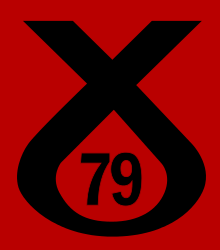
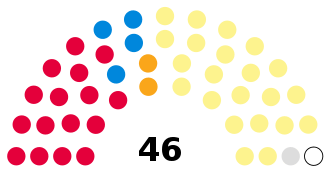

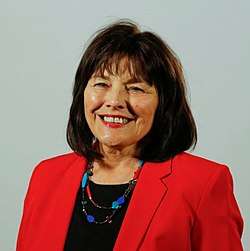
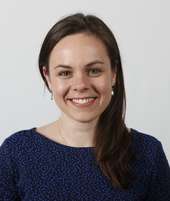
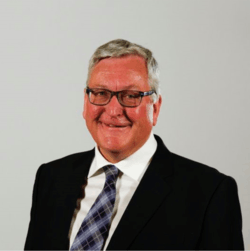
.jpg)

